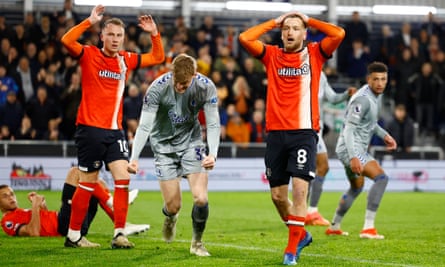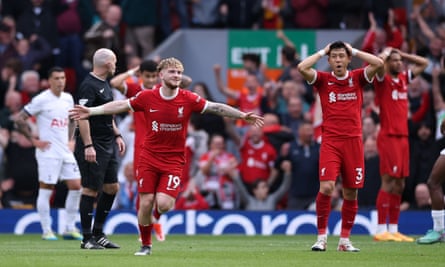Cole Palmer, 22 (Chelsea)
A team would have to be pretty near perfect to deem Palmer surplus to requirements but such is Manchester City’s level they could not find a regular place for him. Still, the attacking midfielder’s £42m move from Manchester City to Chelsea has worked out for all parties – giving City some financial fair play wriggle room while bestowing upon Chelsea a shining light in another muddled season. Palmer is the main reason Mauricio Pochettino’s side managed a top-half place. The City academy graduate has combined crowd-pleasing flicks and tricks with a ruthless, determined streak illustrated by the manner in which he has supplanted Raheem Sterling (and the squabbling Nicolas Jackson and Noni Madueke for that matter) as the club’s penalty taker. His nerveless conversion of the equaliser in Chelsea’s 4-4 rollercoaster against City in November should have settled that argument and beyond that his 22 league goals and 11 assists have made him the most important creative player at Stamford Bridge. His former manager Pep Guardiola described him as “the most decisive player of the season” last month. Now his current one needs to build something cohesive around him next term.
Jarrad Branthwaite, 21 (Everton)
It’s easier to be a young showboating forward in a thriving team than an overworked defender in a struggling one, and Branthwaite has thrived despite the noises off the field about points deductions and unconvincing takeover bids at Goodison Park this season. Amid all this Sean Dyche’s side have probably not received the credit their improvement has merited, and Branthwaite was a big reason why Everton did not go into the closing weeks of the campaign dogged by their customary relegation angst. The Carlisle academy graduate is in the Premier League’s top 10 for interceptions and no one his age or younger has made more than his 50, a testament to his astute reading of the game. Branthwaite has weighed in with a couple of valuable, celebrated goals too, such as his late equaliser against Tottenham in February and the victory-clincher in April’s Merseyside derby. England defensive mainstay status surely beckons, even if Everton’s finances make keeping him a tall order.

Michael Olise, 22 (Crystal Palace)
A player can prove their worth through absence, and Crystal Palace’s early- and mid-season toils owed something to Olise’s hamstring injury. Sure, the signing of Adam Wharton, the form of Eberechi Eze and the galvanising impact of the new manager, Oliver Glasner, have been factors but Olise has been the star turn in Palace’s barnstorming run-in. The outsmarting of Liverpool at Anfield and the demolition of Manchester United at Selhurst Park were two of the signature performances by any team this season and Olise spearheaded both. His ability to play as both a No 10 and to drift out left give him a mobility that is an exhausting challenge for defenders and, when allied to his explosive finishing ability, make him a cherished figure among Palace fans, who inevitably face a summer of fretting as Olise is relentlessly linked with richer clubs.
Harvey Elliott, 21 (Liverpool)
As a certain end-of-era melancholy descended on Anfield this season, with the summer exit of Jürgen Klopp and speculation rife about the futures of stalwarts such as Mohamed Salah and Virgil van Dijk, Liverpool have needed new stories. And in the youngsters who plugged the team’s myriad injury-created gaps this season they got some, nowhere more than in the assertive development of Elliott. Earlier in the season he spoke of wanting to cast off his supersub tag and while 23 of his 34 appearances for Liverpool this season have come off the bench this has undoubtedly been his most influential season. He has brought width, crossing ability and industriousness to an attack that has underperformed and will be a key asset to the incoming manager, Arne Slot, either on the right of a midfield three or a wide forward. This is his time.

Kobbie Mainoo, 19 (Manchester United)
Since excelling on his full debut, in the 3-0 win at Everton in November, Mainoo has provided one of the few sources of encouragement for Manchester United in another season of dysfunction. Within four months of that debut the Stockport-born teenager was making his England bow, impressing in midfield with his control, vision and elegance and even drawing comparisons with Luka Modric. For United fans, he lifted spirits with a sumptuous equaliser against Liverpool and a brilliantly executed last-gasp winner at Wolves. His maturity and composure are self-evident and have been quickly identified by the manager, Erik ten Hag, demonstrating that United’s fabled youth system can still polish gems. The fact that Ten Hag’s side fell apart after Mainoo’s withdrawal in the second half of the FA Cup semi-final against Coventry offered another example of just how important he has become.








More Stories
Amorim insists Fernandes not leaving Manchester United amid Madrid reports
How debt burden pushed Nigerian boxer Segun Olanrewaju to a fight that took his life
Nigeria Taekwondo Federation boss, Abdullahi Saidu dies at 53